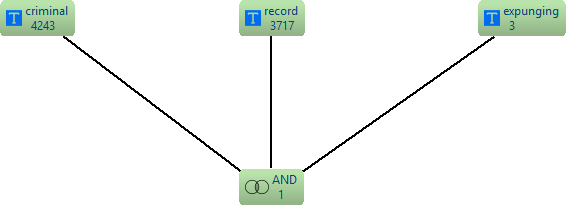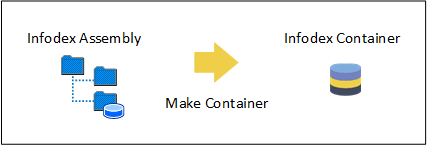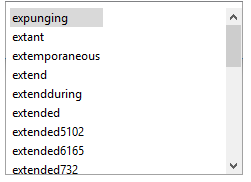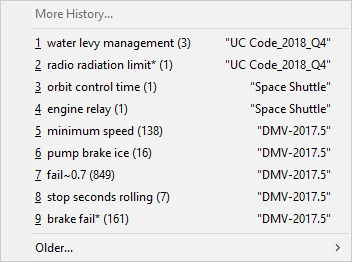What’s Infodex Search?
Infodex Search is an Information Retrieval Platform that can be used by anyone. It is an advanced storage container for your content. The Infodex can store, analyze, and index document data. The Infodex can remain private for your use, or can be shared with others. The Infodex is content-agnostic and can use almost any data. The Infodex platform is extensible, and currently, there are plug-ins for processing and displaying of PDF and HTML/XML content.
The Infodex allows document navigation and features a Query Assistant and Advanced Query Graph to create an interactive and visual way to search. The Infodex can be continuously updated to include new content and reorganize old. The Infodex can be shared over a file network or deployed as a single file container for easy downloading and distribution. It can be used for Electronic Publishing, such as a collection of valuable reference material or in the field documentation.
Query Graph
The Query Graph is a graphical representation of the user’s query results.

As the user enters a query, it is evaluated and drawn as an inverted hierarchical tree. Each word (term) in the query is represented by a branch on the tree. The branch is labeled with the term and its corresponding search count. The count is the number of pages the term appears in across all documents in the Infodex. The count clearly identifies how each query term strengthens or weakens the overall search. Additional non-term branches appear lower in the tree to reflect boolean operations (Boolean Branches) all the way down to the root. The user’s query terms ![]() begin on top and with the combination of boolean operators
begin on top and with the combination of boolean operators ![]() (AND)
(AND) ![]() (NOT)
(NOT) ![]() (OR), progressing down to the single, final result branch or root of the tree.
(OR), progressing down to the single, final result branch or root of the tree.
Workspace Flexibility
Most Information Retrieval and Search platforms require documents, indices, analysis output, and other resources to be held in a centralized, non-portable, database or file-server facility.
The storage requirement for creating and maintaining Infodexes is a single, top-level Workspace directory, and can be located either locally on the computer or a file network. A Workspace is just like any other directory and can be moved, backed up and restored without any special tools or IT specialists. Workspaces are typically used to help separate your work, departments, organizations, or subject matter, etc.
Infodex Container

The Infodexes you create are located in your Workspace. When the time comes to share and distribute the Infodex to others, a single-file Infodex called an Infodex Container is created. The Infodex Container stores a full snap-shop of your Workspace Infodex with all of its resources and analysis files. The Infodex Container enables complete distribution flexibility and can be made available on a local computer, network file storage, web site download, FTP, or deployed for in the field mobility.
Query Assistant
The Query Assist automatically analyzes the term directly under the editor cursor. Depending on the query type (fuzzy, term, wildcard) the corresponding matching terms are computed and displayed beneath the cursor in a pop-up list. For example, If the query contains a wildcard, the Query Assist list shows relevant wildcard results, i.e., “ex*”.

Using the arrow keys to change the selected replacement term and TAB to replace the editor’s term.
Hit-list

After entering a query in the Query Editor, the search results will appear in the Hit-List view. The Hit-List summarizes the results of your search by displaying the KWIC (Key Words In Context) and shows your query terms as they appear in the matching document page. The KWIC enables you to quickly scan the hit-list for relevant and interesting hit documents.
Walking through the Hit-List is easy using the graphical user interface or keyboards controls. Navigation options include fine-grained movements between each query term in the hit-document or quickly moving between hit-pages for quicker review. For later reference, the Hit-List information can be exported to the clipboard or a file.
History
“What was that query?” Constructing the perfect query is hard work. After you build the query in the Query dialog with the help of the Query Graph and Query Assistant, the final query is saved for later reuse. The Infodex Navigator saves your query, the hit-result count, and the Infodex used. Query History is available when using the Query Dialog.
